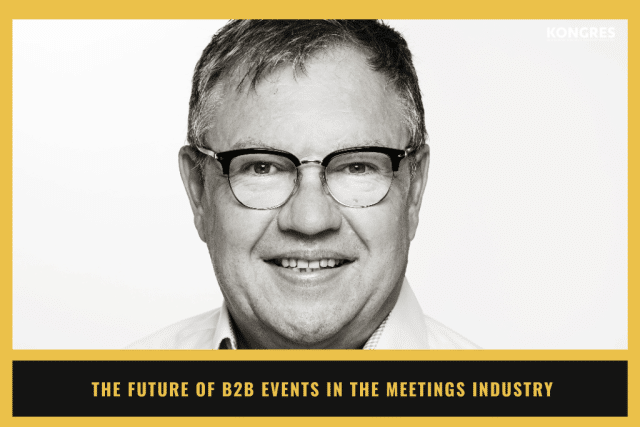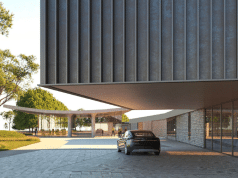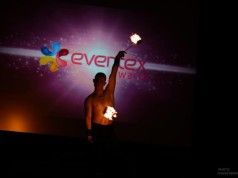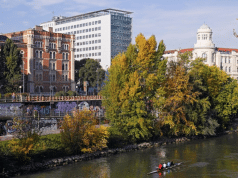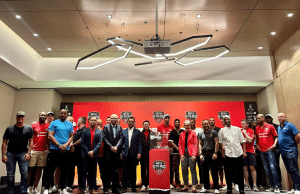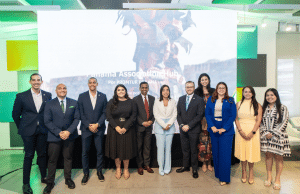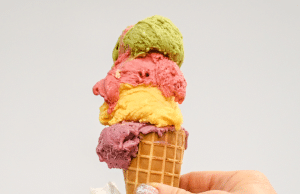INTRO: Can you describe your event in four words?
Targeted, business-oriented, contemporary, and meaningful.
Q1: What makes your trade show stand out from the competition?
Our “Hybrid Sales Concept” offers suppliers a unique opportunity to generate business through a combination of online and event sales. This approach enables exhibitors at MICEboard events to reach out to both attendees at the physical events, as well as online event planners who may not have been able to attend in person.
Two key factors must be in place for this concept to work effectively. Firstly, events must be specifically targeted towards a particular audience to ensure that exhibitors find the event worthwhile. That means that we only allow international suppliers to exhibit, while buyers must be event planners from Germany, Austria, and Switzerland who are involved in organising international events. If we were to allow exhibitors from Germany, we would also need to allow event planners who only organise events in Germany, which would be of little use to international suppliers.
Secondly, suppliers benefit greatly from our comprehensive online promotion, which showcases their products and services before the event. This increases their visibility in German-speaking European markets, generating interest from event planners and often leading to concrete inquiries. All exhibitor information and contact details are publicly available on the MICEboard.com community page, allowing buyers to make informed decisions about which suppliers to engage with at the event.
Our events are popular with buyers because they have a clear understanding of what to expect, including which suppliers they will meet and what they offer. This provides a professional basis for deciding whether or not to participate, which is not typically provided by comparable trade shows and events.
Q2: What are your further steps and vision to develop your event?
In the world of MICE, the Supplier MICE Sales industry is on the brink of radical change. AI tools such as ChatGPT and the new BING are poised to be game-changers in the MICE industry. These AI tools, which can behave like humans, enable event planners to generate information that is much more tailored to the specific requirements of their events.
ChatGPT can provide creative ideas and suggestions for designing and executing events based on the client’s requirements and the type of event. It can also suggest themes, decorations, activities, music, entertainment, and other aspects of the event and provide concrete recommendations. It can help event planners find suitable event venues, suppliers, service providers, and other vendors needed for the event. It can also make recommendations based on ratings, reviews, and other feedback. And ChatGPT is still in the beta phase, which means it will only improve with time.
This development is comparable to the introduction of the iPhone and the invention of apps. The interest of an event planner in personal interaction with a supplier is being pushed even further back. Studies show that a buyer only wants to speak to a seller in person once they have completed at least 75% of their decision-making process. My vision is that in the future, we will communicate even better and more targeted content from our event exhibitors and clients to our target groups (event planners) in advance. Content that will be different for different target groups: for planners from companies, for planners from agencies, for associations, and with reference (in language, form, and expression) to our target destinations Germany, Austria, and Switzerland.
This will lead to us actually winning highly business-motivated event planners with an exclusive interest in our event exhibitors (singular and plural) as Hosted Buyers, but also losing some because the information published in advance will be enough for them to consider suppliers and discuss them with their corporate clients (in the case of agencies). However, a personal conversation with the exhibitor is not necessary at that time because they have not yet reached 75% of their decision-making process. But they are considering exhibitors at our events. In the end, it doesn’t matter whether the exhibitor generates business through the conversation at our event or afterwards. The fact is: if they hadn’t participated in our event, they certainly wouldn’t have generated the business.
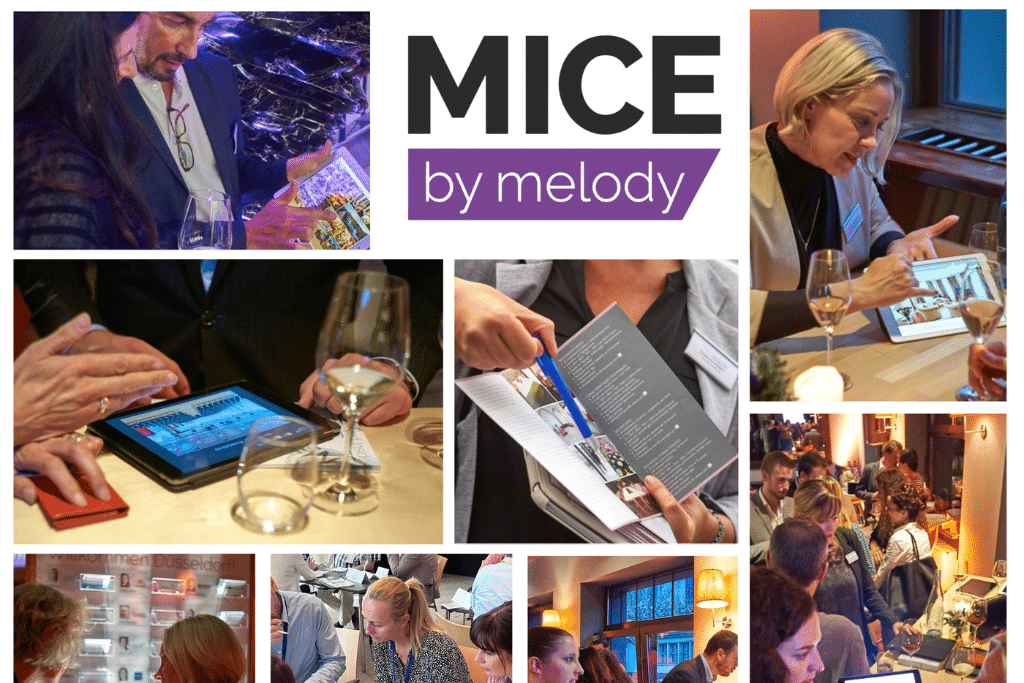
Q3: Our research has shown that exhibitors find the quality of hosted buyers most important. How do you ensure the quality of hosted buyers at your event, and what is your guarantee for the exhibitors?
We do not offer any guarantees. It is not our responsibility to evaluate quality, as the concept of “quality” depends on the individual perspective of each supplier. What one supplier considers to be “quality” may not be the same for another. Additionally, the term “hosted buyer” should be used with caution, as there is a difference between an event planner participating as a “hosted buyer” versus a regular “participant”. Hosted buyers can only attend if they have access to comprehensive information about all exhibitors prior to their registration. However, this is not the case for 9 out of 10 sales events. Therefore, on 9 out of 10 sales events, only “participants” attend, as event planners only find out which exhibitors they will meet after their registration is confirmed. This raises two questions: 1) Why did event planners register without knowing which suppliers – and thus, which potential business opportunities – they will meet? And 2) How do suppliers justify their investments in sales events where none of the participants is aware beforehand that they will attend as exhibitors?
As organisers of sales events, we operate similarly to a shopping mall operator. Exhibitors are like stores in the mall, and it is our responsibility to ensure that the mall’s target audience is well-informed about the exhibitors and their brands, products, services, and offers. This is the key to attracting visitors to the mall. However, it is not our responsibility to guarantee actual sales in the stores. We communicate extensively and in advance about the exhibitors who participate in our MICEboard industry events, as a decision-making basis for event planners to attend the events. Ultimately, supply and demand determine the success of the event.
Q4: What are the conversion statistics for your shows (conversion rate)?
Through the implementation of the “Hybrid Sales Concept,” exhibitors are able to generate business in the days, weeks, months, and even years following their participation in a MICEboard industry event. Statistically, more business is generated post-event rather than during the event itself. While it is rare for transactions to occur directly at MICE sales events, the majority of business is generated afterwards. Suppliers who have participated in our industry events benefit the most, as planners are able to quickly locate them online. This is much faster than sifting through business cards received from suppliers at other sales events. Google provides a quicker and more comprehensive means of accessing information about the supplier than what is available on a business card. In the medium to long term, our sales conversion rate for suppliers is thus certainly higher than the average for comparable fairs and events.

Q5: Will your event stay the same size, or do you have plans to expand it?
We are pleased to offer an annual roadshow, MICE by Melody, held each September in Germany’s major cities of Düsseldorf, Frankfurt, and Munich. This event is exclusively for international suppliers, and we regret to inform German suppliers that they are not permitted to attend, as is standard practice for all MICEboard events. In addition to our roadshow, we also host several other exclusive events, such as MICE PEAK, MICE BOAT, and GREEN MILE, which are held outside of Germany or on the high seas. These events are held on a rotating basis rather than annually.
We recognise that the industry is currently inundated with sales events, with event planners clamouring for attendance. Unfortunately, many of these events tend to prioritise personal enjoyment over serious business considerations, with an emphasis on fun and entertainment to attract attendees. This approach is not for us, as we firmly believe in maintaining a professional atmosphere that focuses on productive conversations and networking.
Therefore, we have made the decision to limit our number of events and maintain a maximum attendance of 30 suppliers and 60 hosted buyers at all of our events. That ensures that each participant has ample time for meaningful conversations with others in attendance.
Q6: We liked to draw parallels with the past during the corona crisis. What have we learned from the past to make our industry better and more responsible towards the environment and attendees?
Have we really got it? Of course, we are (once again) addressing the topic of “sustainable event planning.” This has been a regular summer lull topic in the MICE press from around 2000 to 2019. Now, at least (and finally!), it has a higher level of seriousness than before the COVID-19 crisis. Hotels are ramping up their sustainability efforts, not because of the MICE industry, but due to the pressure they receive from the companies with whom they want to sign corporate lodging contracts for business travellers. This is where most of the pressure to become more sustainable comes from. But where does sustainability in events begin and end? Local food at the buffet? Hotel toilets with rainwater flushes? Honey from bees on the hotel roof? Or with the categorical exclusion of destinations that violate human rights, where gender equality does not exist, homosexuality is punished, and social injustices are commonplace? In reality, we should start right there, categorically excluding destinations for events and incentives where social sustainability is massively and blatantly violated. That would be honest. But it’s not going to happen.

Q7: What are your priorities for creating a carbon-neutral meetings industry? Can you illustrate with concrete examples implemented at your event?
We have been repeatedly asked by the MICEboard community – German-speaking event planners who frequently organise events abroad – about the best places outside Germany to plan, organise, and execute sustainable events and with which qualified partners. In response to these inquiries, we launched the “Green Mile” initiative in the summer of 2022 and established a section on MICEboard.com where we post publications about suppliers related to this topic. The aim of the Green Mile is to introduce international exhibitors to concrete solutions and products for sustainable event planning and connect them with event planners.
We make every effort to ensure that this specialized event is as environmentally friendly as possible. All service providers that we engage with operate sustainably. Our catering relies primarily on regional and seasonal products, with a strong emphasis on vegetarian dishes. Furthermore, we take into account the destination where we hold the Green Mile. Destinations that blatantly violate human rights, fail to ensure gender equality, or prohibit homosexuality are not considered potential event destinations. This principle applies to all MICEboard specialized events, and we are firmly committed to upholding this stance.
Q8: Which event in the meetings industry do you see as the benchmark and why?
I don’t have a specific event in mind. In general, many formats have lost more than they have gained, in my opinion. I no longer recognise the strengths of a MICE trade fair today compared to 2018 and previous years. Times have changed significantly, and time itself has become an increasingly valuable but scarce commodity. Sales events now leave out almost every aspect of the business. Aside from luring event planners with great invitations to great destinations, they have lost any business aspect in their communication. Event planners receive invitations to fancy destinations and are enticed with spectacular hosted buyer programs. However, the business aspect of such events remains completely nebulous. One could also expect a poodle beauty contest on site. Who knows?
Q9: What are your thoughts on the so-called table-top concept, now prevalent among B2B events? Is this enough for an immersive experience that will satisfy attendees? What are the benefits of such a concept compared to classic exhibitor stands at large trade shows?
Counter-question: Why are Table-Top concepts so prevalent in 99% of MICE sales events around the world? The reason is that exhibitors expect to simply sit at their assigned table and have the organiser continuously place new event planners at their table in 15-minute intervals. This puts massive pressure on the organisers because, unlike MICE fairs, the supplier does not communicate their participation. If Suppliers participate in a MICE fair, they send numerous invitation mailings to their databases and invite their contacts to visit them at the fair booth. They advertise posts on social media and take numerous PR measures that urge event planners to visit them at the fair. However, if they participate in one of the many sales events, they remain silent.
As a result, the organiser receives hardly any relevant information, so they seek a good solution for their business. They focus on promoting a highly attractive destination with exclusive locations and hotels, as well as spectacular programs to attract event planners to participate. This way, they can recruit as many planners as possible and satisfy the demand of their suppliers for four face-to-face appointments within an hour. The problem is that while many participants are recruited, there are no hosted buyers. They can only be won over if they had detailed knowledge of the participating suppliers, their brands, products, services, and offerings beforehand.
Therefore, Table-Top concepts are a triumph of foolishness in MICE sales and, for event planners, they are, first and foremost, wonderful short trips where personal fun is at the forefront, and certainly not the table appointments with the supplier. These are simply the “price” for three or more days in a 5-star hotel in a fascinating destination.
MICE fairs are popular meeting places to reunite, make new contacts, and maintain existing ones. That’s great, but it can also be counterproductive for serious business interests. Fair booths almost never have closed meeting rooms, but rather numerous tables and chairs, more or less skillfully and very tightly distributed over the designated areas. There is always an improvisational and coincidental aspect to it. Appointments are not kept because one of the conversation partners was delayed, or appointments must be conducted in under 5 minutes. Even if you have managed to snag your conversation partner, there is simply no available space on the fairgrounds because oysters with champagne or fries with beer are being served, and illustrious fair visitors are occupying all the seats. No, and really no fair visit runs ideally. This raises the question of how much fair visiting actually makes sense.
The MICE sales of a large hotel chain had just as many orders on the first MICE fair that was possible after the pandemic as in the previous year when the fair did not take place due to the pandemic. Such facts should make us think. Fairs are certainly facing great challenges – not just MICE fairs – in general. It depends on the respective industries and how they will master them. There is no universal solution for this. However, one thing can certainly be said: if the MICE industry wants to seriously address the issue of sustainability, it certainly cannot be done with trade fairs where exhibitors demand that their meeting tables and appointment calendars be fully booked with hosted buyers by the organisers, who in turn need to fly in event planners from around the world. It remains to be seen how the fairs will fare in the future.
If a supplier wants to seriously and successfully promote themselves and their services today, they should only participate in sales events and exhibitions where they receive the most online media coverage from the organisers in advance. Additionally, they should use these and all other sales activities as an opportunity to publish numerous and extensive online content communication measures. That is the only way to justify their investments in fam trips, their own sales events, and even their sales calls. It’s important to steer clear of sales events where the organizer does not extensively communicate the supplier’s participation in advance. And by this, I don’t mean simply displaying the supplier’s logo somewhere. I mean actual content communication with relevant information for event planners.
Q10: Can you name one core problem you believe the global meetings industry should tackle together?
During the pandemic, it became evident in many countries how strong or weak the MICE industry is perceived. It was largely not deemed as “systemically relevant” and not taken seriously by many. Therefore, the MICE industry should strive to gain credibility, both in public perception and on a political level.
About Peter Cramer
Peter Cramer, born in 1967 in Hagen, Westphalia, started organizing events with musicians and bands at the young age of 16. In 2012, he launched MICEboard as a platform and community that is now used monthly by thousands of event planners for research, providing information on international suppliers and their offers.
Learn more about MICEboard here.


